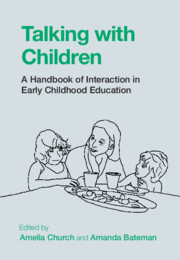Book contents
- Talking with Children
- Talking with Children
- Copyright page
- Dedication
- Contents
- Figures
- Tables
- Contributors
- Acknowledgements
- Notes on Transcription Conventions
- Introduction
- Part I Talk as Social Action
- Part II Pedagogy in Interaction
- 8 Literacy
- 9 Storytelling
- 10 Digital Technologies
- 11 Mathematics
- 12 Creativity
- 13 Multilingualism
- 14 Belonging
- Part III Interaction and Inclusion
- Index
- References
8 - Literacy
from Part II - Pedagogy in Interaction
Published online by Cambridge University Press: 16 June 2022
- Talking with Children
- Talking with Children
- Copyright page
- Dedication
- Contents
- Figures
- Tables
- Contributors
- Acknowledgements
- Notes on Transcription Conventions
- Introduction
- Part I Talk as Social Action
- Part II Pedagogy in Interaction
- 8 Literacy
- 9 Storytelling
- 10 Digital Technologies
- 11 Mathematics
- 12 Creativity
- 13 Multilingualism
- 14 Belonging
- Part III Interaction and Inclusion
- Index
- References
Summary
In education settings for very young children, both theoretically and empirically, adults’ institutional role and pedagogical practice in relation to children’s play is traditionally tied to education and caring, such as maintaining classroom order or providing emotional availability and con?ict resolution. Most of these institutional roles are positioned outside the actual play frame. Thus, detailed empirical descriptions of the adult as an equal co-player in a multi-party peer context are scarce. This chapter examines play in adult-child interaction. The role of the adult in initiating and maintaining playful encounters with very young children in a multi-party context is of particular interest. The pedagogical contribution of the chapter is to facilitate early childhood education practitioners’ use of playful encounters in relation to emotional education. Three empirical extracts reveal how adult conduct can shape opportunities for multi-party, emotionally heightened playful encounters in toddler classrooms. Overall, the chapter shows how conversation analysis can encourage dialogue with theory and practice by providing a more detailed picture of practices that are described in professional stocks of interactional knowledge such as curricula and frameworks in early childhood education.
- Type
- Chapter
- Information
- Talking with ChildrenA Handbook of Interaction in Early Childhood Education, pp. 165 - 184Publisher: Cambridge University PressPrint publication year: 2022

